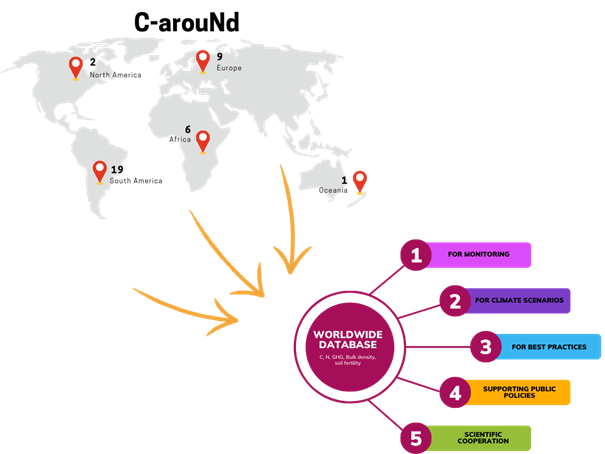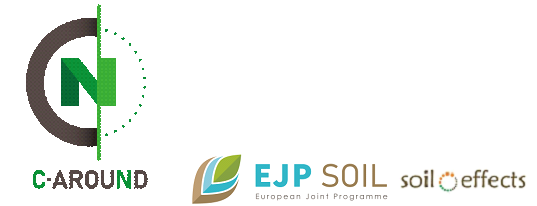
Enhancing soil conservation and regenerative practices to maximize carbon storage and minimize greenhouse gas emissions.
The project is one of the 8 new cutting edge research programs under the EJP SOIL programme. The objective of C-arouNd is to evaluate the influence of conservationist and regenerative agricultural practices on carbon (C), nitrogen (N) and phosphorus (P) cycling, soil biodiversity and GHG emissions with a particular emphasis on long-term SOC stocks, and processes governing C persistence.

Agricultural practices that increase soil C stocks and reduce GHG emissions are desirable strategies for the mitigation of global warming, and international initiatives have been launched as 4per1000 at the COP21 meeting in Paris (2015), to promote agricultural practices that increase soil C stocks as a global warming mitigation strategy.
Moreover, increasing SOC will have positive effects on agricultural production due to increase nutrients and water cycling, and on soil health due to its positive relationship with soil biodiversity. The objective of this project is to evaluate the influence of conservationist and regenerative agricultural practices on carbon (C), nitrogen (N) and phosphorus (P) cycling, soil biodiversity and GHG emissions with a particular emphasis on long-term SOC stocks, and processes governing C persistence.
This project represents an exploratory effort to couple the stoichiometric drivers to microbial populations related to C, N, and P cycling and stocks, and GHG emission under diverse agricultural practices. For this, we are establishing a consortium of long-term field experiments that evaluate the impact of different cropping systems and agricultural practices on soil properties.
Key Objectives
- Assessing Agricultural Practices: Evaluate the influence of conservationist and regenerative agricultural practices on carbon (C), nitrogen (N), and phosphorus (P) cycling, soil biodiversity, and GHG emissions across diverse ecosystems and management approaches.
- Long-Term Field Experiments: Conduct long-term field experiments at 37 sites, with 26 sites established for at least ten years, to gather comprehensive data on soil properties, carbon and nitrogen stocks, bulk density, and soil fertility.
- GHG Emission Estimation: Estimate N2O, CO2, and CH4 emissions from crop/pasture/forestry systems using IPCC or local emission factors at selected sites to analyze the impact of different climatic and edaphic conditions.
- Soil Organic Matter Fractionation: Develop a standard soil organic matter (OM) physical fractionation procedure to differentiate particulate organic matter (POM) and mineral-associated OM (MAOM). Evaluate the role of each fraction in carbon storage and soil health.
- Worldwide Database Creation: Build a comprehensive database of C and N stocks, soil fertility, and GHG emissions under various agricultural management practices and ecosystems from the global consortium.
- Identifying Best Management Practices: Determine the effect of climatic conditions, net primary production, and soil type on carbon and nitrogen stocks, nutrient dynamics, and GHG emissions. Recommend best management practices to enhance soil carbon accumulation, especially MAOM, while reducing GHG emissions.
Expected Outcomes
This project will contribute valuable insights to enhance agricultural sustainability by promoting soil carbon sequestration and mitigating GHG emissions. The findings will provide essential data on the impact of different agricultural practices on soil health and carbon storage. By identifying best management practices, the project aims to foster resilient agriculture and align with the UN Agenda 2030 Sustainable Development Goals.

There are participants from 12 different countries with a total of 37 field sites with different chrono-sequences or contrasting agricultural management. At 26 sites established for at least 10 years. Norsøk will participate in the project by making its-long term field experiment SoilEffects available for the consortium.



